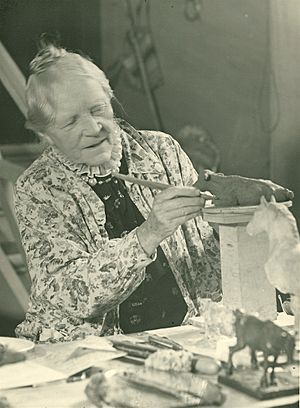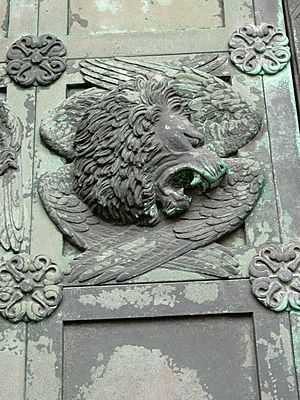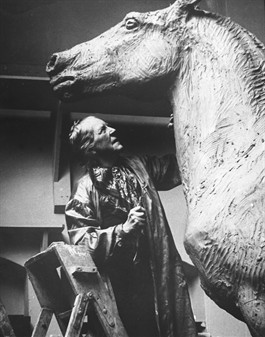Anne Marie Carl-Nielsen facts for kids
Quick facts for kids
Anne Marie Carl-Nielsen
|
|
|---|---|

Anne Marie Carl-Nielsen working on a sculpture
|
|
| Born |
Anne Marie Brodersen
21 June 1863 Sønder Stenderup, Denmark
|
| Died | 21 February 1945 (aged 81) Copenhagen, Denmark
|
| Nationality | Danish |
| Known for | Sculpture |
|
Notable work
|
|
| Awards |
|
Anne Marie Carl-Nielsen (born Anne Marie Brodersen; 1863–1945) was a famous Danish sculptor. She loved to create sculptures of animals and people. Her art showed their movements and feelings in a very real way. She also made art inspired by Nordic myths.
Anne Marie was one of the first women to be truly respected as a sculptor. She set new trends in Danish art for many years. She was married to the well-known Danish composer Carl Nielsen.
Becoming an Artist: Early Life and Training
Anne Marie Brodersen was born on June 21, 1863. Her family lived on a large farm called Thygesminde in Denmark. Her father, Povl Julius Brodersen, was a former soldier. He bought the farm and married Friderikke Johanne Kirstine Gilling.
The Brodersens were very successful farmers. They were among the first to bring livestock directly from England. Because of this, Anne Marie grew up knowing a lot about farming and animals.
First Sculptures and Art School
Anne Marie made her first sculpture in 1875. It was a small sheep, created using clay from the farm garden. From 1881 to 1882, she studied at schools for carving and drawing. She also learned from famous artists like sculptor August Saabye.
She first showed her artwork at the Charlottenborg Spring Exhibition in 1884. In 1887, she won first prize in a competition. This was for her fountain group called Thor with the Midgard Serpent. She finished this piece in Saabye's studio.
Travels and Awards
In 1889, Anne Marie received a scholarship from the Art School for Women. This allowed her to travel to the Netherlands, Belgium, and Paris. In Paris, she visited the World's Fair (Exposition Universelle). She entered two sculptures of calves and won a bronze medal.
One of her calf sculptures sold for a good amount of money. Her father was very proud, saying it was more than he got for his own calves! In 1890, she received another grant to visit Paris again, and possibly Italy.
Meeting Carl Nielsen
While in Paris, Anne Marie met the Danish composer Carl Nielsen on March 2, 1891. They quickly fell in love and decided to get married. On May 10, they were married in Florence, Italy. Anne Marie then took the name Carl-Nielsen.
They traveled through Italy together before returning to Denmark. Their first daughter, Irmelin Johanne, was born in December. Anne Marie had already overcome challenges to study art. Now, with her marriage, she had the freedom to pursue her artistic career. This included taking long trips away from home for her work.
Growing Fame and Important Works
In 1892, Anne Marie Carl-Nielsen showed her art at the Free Exhibition in Copenhagen for the first time. She became a permanent member of this group in 1893. Her two bronze calf sculptures were accepted for the 1893 Chicago World's Fair.
Her second daughter, Anne Marie Frederikke (known as Søs), was born in 1893. Her son, Hans Børge, was born in 1895.
Travels and Major Commissions
In 1903, Anne Marie received the Anckerske Grant. This allowed her to take a long journey with her husband to Athens and Constantinople. While in Athens, she copied parts of an ancient Greek sculpture.
In 1904, Anne Marie created three large doors for Ribe Cathedral in Denmark. In 1907, she won first prize in a competition for a monument to a doctor named Niels Ryberg Finsen. She also won first prize for her sculpture A Woman Weeding. She then made sketches for six reliefs for the King Steps at Christiansborg Castle.
Royal Statue and Other Achievements
In 1908, Anne Marie received a very important job. She was asked to create an equestrian (on horseback) statue of King Christian IX in Copenhagen. She was the first woman ever to get such a prestigious commission.
She was a member of the Academy of Fine Arts' Plenary Group from 1912 to 1914. In 1913, she created the monument to Queen Dagmar on Ribe Castle Hill.
In 1916, she helped start the Society for Women Artists with painter Anna Ancher. The Equestrian Statue of King Christian IX was finally revealed on November 15, 1927. Two days later, Anne Marie received the Ingenio et Arti gold medal for her work.
In 1928, she created a portrait bust (head and shoulders sculpture) of her husband. For this, she was awarded the Thorvaldsen Medal in 1932. She even entered her art in the art competitions at the Summer Olympics in 1932 and 1936.
Later Life and Legacy
In 1933, part of the equestrian monument's base was used for another sculpture. This new work, called Danish Fisherman and Rescuer, was placed in Skagen. Anne Marie became a member of the committee for the Anckerske Grant in 1935.
She created The Headman and Queen Margrete I in 1942. Many events celebrated her 80th birthday. She was also made an honorary member of the Danish Society of Sculptors.
Anne Marie's husband, Carl Nielsen, passed away on October 3, 1931. She created two monuments in Denmark to honor his memory. The Herd Boy playing a Wooden Flute (1933) is in Nørre Lyndelse, where he was born. The Young Man playing Pan-pipes on a Wingless Pegasus (1939) is in Copenhagen. She wanted these sculptures to show movement and the feeling of life.
Anne Marie Carl-Nielsen died on February 21, 1945. Her funeral was held in Copenhagen Cathedral. She is buried next to her husband in the Vestre Cemetery.
Images for kids
See also
 In Spanish: Anne Marie Carl-Nielsen para niños
In Spanish: Anne Marie Carl-Nielsen para niños
- Danish sculpture





